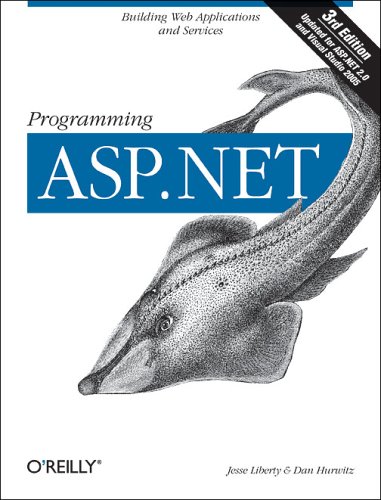Programming ASP.NET: Building Web Applications and Services with ASP.NET 2.0 (Programming)






 Our Price: £23.08
Our Price: £23.08
RRP: £35.50
You Save: £12.42
Availability: Usually dispatched within 24 hours
Authors: Jesse Liberty, Dan Hurwitz
ISBN: 059600916X
Publisher: O'Reilly Media, Inc.
Publish Date: 26-10-2005
Pages: 930
Suitable for most any programmer who wants to master ASP.NET with an eye toward real-world development, Programming ASP.NET is an excellent resource that mixes good coverage of APIs with actual programming techniques and advice using Visual Basic .NET and C#. The combination places it in the forefront of currently available titles on ASP.NET.
Written in part by veteran computer author Jesse Liberty, this book offers an excellent mix of coverage of important ASP.NET features that you will absolutely need to use for real-world programming. Readers with previous ASP experience will appreciate early sections that compare an older ASP sample with the new ASP.NET to highlight what's new and improved, with good explanation of the ASP.NET event model. The pace of this book is just excellent. The authors first move through the essentials, like basic ASP Web controls and data binding, before delving into data-driven applications using the (slightly complicated) ASP.NET database APIs. It also helps that the authors let you use Notepad (or another text editor) to create your ASP.NET programs first. (Later, they cover the details of Visual Studio .NET, pointing out how this tool can sometimes make it difficult to see where your code is generated.) There's also coverage of debugging and tracing techniques.
Standout sections on the calendar, Repeater, DataList, and DataGrid controls (all presented in good detail) will help you master these important controls. Coverage of techniques and support for validating user input in Web pages will also help you use these essential features.
The author's well-measured tutorial on Web services (much touted by Microsoft) is as good as any. Their demos (using a well-traveled example of a stock ticker server) will show you what all the fuss is about. They cut through the hype here and manage to show why Web services are a potentially better way toward distributed computing. Later sections look at deployment, configuration, and performance (as well as caching) options that you'll need to deploy and run your ASP.NET programs successfully. Coverage of security options in .NET rounds out the tour of what you'll need to create real applications.
Illustrated throughout with samples from VB .NET and C#, Programming ASP.NET is a worthy addition to the O'Reilly lineup and one of the best available titles for learning ASP.NET. The authors have achieved an excellent balance of practical, hands-on examples and essential programming techniques with the most important APIs and features, all without getting bogged down in the richness and complexity of .NET itself. --Richard Dragan
Topics covered: Introduction to the .NET platform and ASP.NET; basic programs in HTML; ASP and ASP.NET compared; events in ASP.NET (application, session, page, and control events); HTML and ASP controls compared; basic ASP controls APIs (including in-depth coverage of calendar support); code behind forms; using the Visual Studio .NET IDE; tracing, debugging, and error handling; validation controls in ASP.NET (including built-in and custom validators, plus regular expression support); basic data-binding techniques; list and DataGrid controls; ADO.NET tutorial (basic APIs and programming techniques); calling stored procedures; updating database records; Repeater and DataList controls used with ADO.NET; custom ASP.NET controls (including derived, composite, and full custom controls); overview of Web services (including SOAP, WSDL, and other standards); creating and consuming a sample Web service for a stock ticker; ASP.NET caching techniques explained (including fragment and object caching); security options in ASP.NET for authentication, authorization, and impersonation; configuration and deployment options in ASP.NET (including XCOPY deployment); and an appendix with a quick tutorial on database design.


